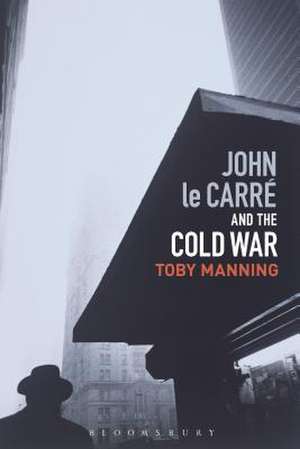John le Carré and the Cold War
Autor Dr Toby Manningen Limba Engleză Paperback – 18 sep 2019
| Toate formatele și edițiile | Preț | Express |
|---|---|---|
| Paperback (1) | 231.16 lei 6-8 săpt. | |
| Bloomsbury Publishing – 18 sep 2019 | 231.16 lei 6-8 săpt. | |
| Hardback (1) | 715.42 lei 6-8 săpt. | |
| Bloomsbury Publishing – 24 ian 2018 | 715.42 lei 6-8 săpt. |
Preț: 231.16 lei
Preț vechi: 297.28 lei
-22% Nou
Puncte Express: 347
Preț estimativ în valută:
44.23€ • 46.18$ • 36.61£
44.23€ • 46.18$ • 36.61£
Carte tipărită la comandă
Livrare economică 05-19 aprilie
Preluare comenzi: 021 569.72.76
Specificații
ISBN-13: 9781350122161
ISBN-10: 1350122165
Pagini: 256
Dimensiuni: 156 x 234 x 23 mm
Greutate: 0.36 kg
Editura: Bloomsbury Publishing
Colecția Bloomsbury Academic
Locul publicării:London, United Kingdom
ISBN-10: 1350122165
Pagini: 256
Dimensiuni: 156 x 234 x 23 mm
Greutate: 0.36 kg
Editura: Bloomsbury Publishing
Colecția Bloomsbury Academic
Locul publicării:London, United Kingdom
Caracteristici
Reads le Carré in the literary contexts of post-Imperial British fiction, including writers such as Kipling, Conrad, Orwell and Greene
Notă biografică
Toby Manning has taught at Queen Mary University, Brunel University and the University of Birmingham, UK. A former journalist, he is also the author of The Rough Guide to Pink Floyd (2006).
Cuprins
DedicationAcknowledgements Introduction: 'A Nation's Political Health' The enemyThe stateThe nationCold-War consensus to critical consensusChapter 1. 'Murderers and Spies': The Communist Threat and Call for the Dead 'Mass philosophy': The Cold-War enemy 'A symbol of nothing at all': The British state 'Deep love of England': Imagining the nation 'Who was then the gentleman?': Nation, state and enemy Chapter 2. 'Breeze Blocks and Barbed Wire': The Berlin Wall and The Spy Who Came in from the Cold'Party Terms': The communist enemy 'Not quite a gentleman': Leamas and the classless British nation'We are defensive': English empiricism, ideology and the British stateChapter 3. 'Looking at His Own Reflection': The Establishment and The Looking Glass War'A sort of Cuba situation': Reflections of the enemy 'Government hirings': The Department, the Circus and the British state 'The mystery of England': The nation and class Chapter 4. 'Holding the World Together': The Cambridge Spies and Tinker Tailor Soldier Spy'The imminent collapse of the nation': England and the establishment 'Russians taken over the government': The infiltrated British state'Fanaticism' and 'mindless treason': Enemy characterization 'Haydon's crooked deathmask': State, nation and enemy Chapter 5. 'All One Vanishing World': The Honourable Schoolboy, Colonialism and Communism 'Her colonial grip': Britain, the Empire and the special relationship 'A spreading plague': Communism and Southeast Asia Chapter 6. 'Only People': Humanism, Populism, the Second Cold War and Smiley's People 'Deniable blessing': Smiley and the British state'British to the core': Smiley's tour of the nation'The danger is absolute": Karla and communism 'Half-angels' and 'half-devils': Smiley, Karla and the Cold War Conclusion: 'Man, Not the Mass'The enemyThe stateThe nationAppendix I: Plot SynopsesBibliographyIndex
Recenzii
An analysis inspired by venerated figures of 20th-century Marxist literary criticism. This reappraisal of the popular novelist's oeuvre incorporates a fan's enthusiasm with the literary scholar's eye for ideological complexity. Summing Up: Recommended.
John le Carre and the Cold War is highly informative and loaded with historical context.
Manning's study proves to be an important contribution to le Carré scholarship and to criticism of espionage ?ction as a whole. Its signi?cance lies also in laying the foundations for future research.
An important contribution to work on spy fiction and its contexts.
Confidently in command of his materials, Toby Manning has produced a carefully compiled dossier on the historical and political valence of Le Carre's central fiction. His finely nuanced interpretations radiate with an authority indicative of a keen grasp of the literary imagination and a judicious depth of learning.
John le Carre and the Cold War is highly informative and loaded with historical context.
Manning's study proves to be an important contribution to le Carré scholarship and to criticism of espionage ?ction as a whole. Its signi?cance lies also in laying the foundations for future research.
An important contribution to work on spy fiction and its contexts.
Confidently in command of his materials, Toby Manning has produced a carefully compiled dossier on the historical and political valence of Le Carre's central fiction. His finely nuanced interpretations radiate with an authority indicative of a keen grasp of the literary imagination and a judicious depth of learning.
